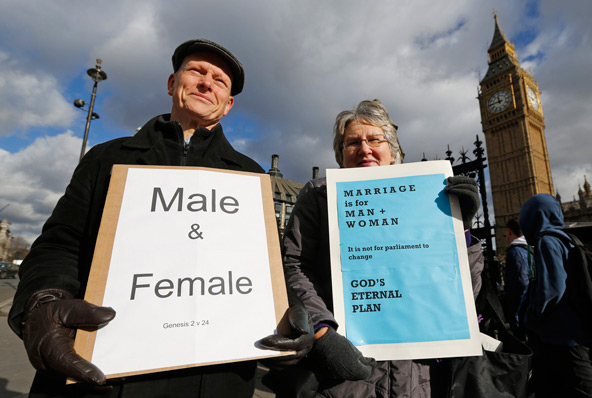
MANCHESTER, England (CNS) — A day before the House of Commons was to vote on a bill on same-sex marriage, the new archbishop of Canterbury restated his opposition.
Anglican Archbishop Justin Welby became the archbishop of Canterbury during an hourlong legal “ceremony of confirmation” at London’s St. Paul’s Cathedral Feb. 4. The rite — which included an oath of allegiance to Queen Elizabeth II — marked the point in which he stepped aside as bishop of Durham and became the leader of the Church of England and spiritual head of 77 million Anglicans in sister churches around the world.
Speaking to reporters afterward, he said that he stood with his brother Anglican bishops in strongly opposing plans by the British government to redefine marriage to include same-sex couples.
“I stand, as I have always stood over the last few months, with the statement I made at the announcement of my appointment, which is that I support the Church of England’s position on this,” he said.
“I am very much with the House of Bishops on this, and they have made their views clear,” said Archbishop Welby.
The Church of England is the established national church in England and has a constitutional role in defining England as a Christian country rather than a secular state. Some Anglican bishops also hold political office as “lords spiritual” in the House of Lords, Britain’s second political chamber.
The office of the archbishop of Canterbury is effectively a political appointment because candidates are chosen by the prime minister, acting in the name of the queen. As a result, conflicts between the Anglican church and the state seldom occur.
The Church of England, the Roman Catholic Church, mainstream Protestant denominations, Jewish, Muslim and Sikh leaders are united in their opposition to the legislation.
The Catholic bishops have said it would pose a threat to religious liberty and the ability of the church to function effectively in civil society.
In January, the bishops distributed a million postcards throughout thousands of parishes in England and Wales to ask the faithful to urge their elected representatives to vote against the proposals.
They also issued a briefing paper to politicians, warning them that the bill, for the first time in British legal history, “fundamentally seeks to break the existing legal link between the institution of marriage and sexual exclusivity, loyalty and responsibility for the children of the marriage.”
The bishops said the redefinition of marriage would lead to more fundamental changes and predicted that proposed safeguards would be inadequate.
Many members of Prime Minister David Cameron’s own Conservative Party oppose the legislation; as many as 200 of the 303 Conservative members of Parliament are expected to either vote against the government’s bill or abstain from the vote.
The bill would have to pass through the House of Lords as well as the House of Commons before it could become law later this year.
— By Simon Caldwell Catholic News Service





